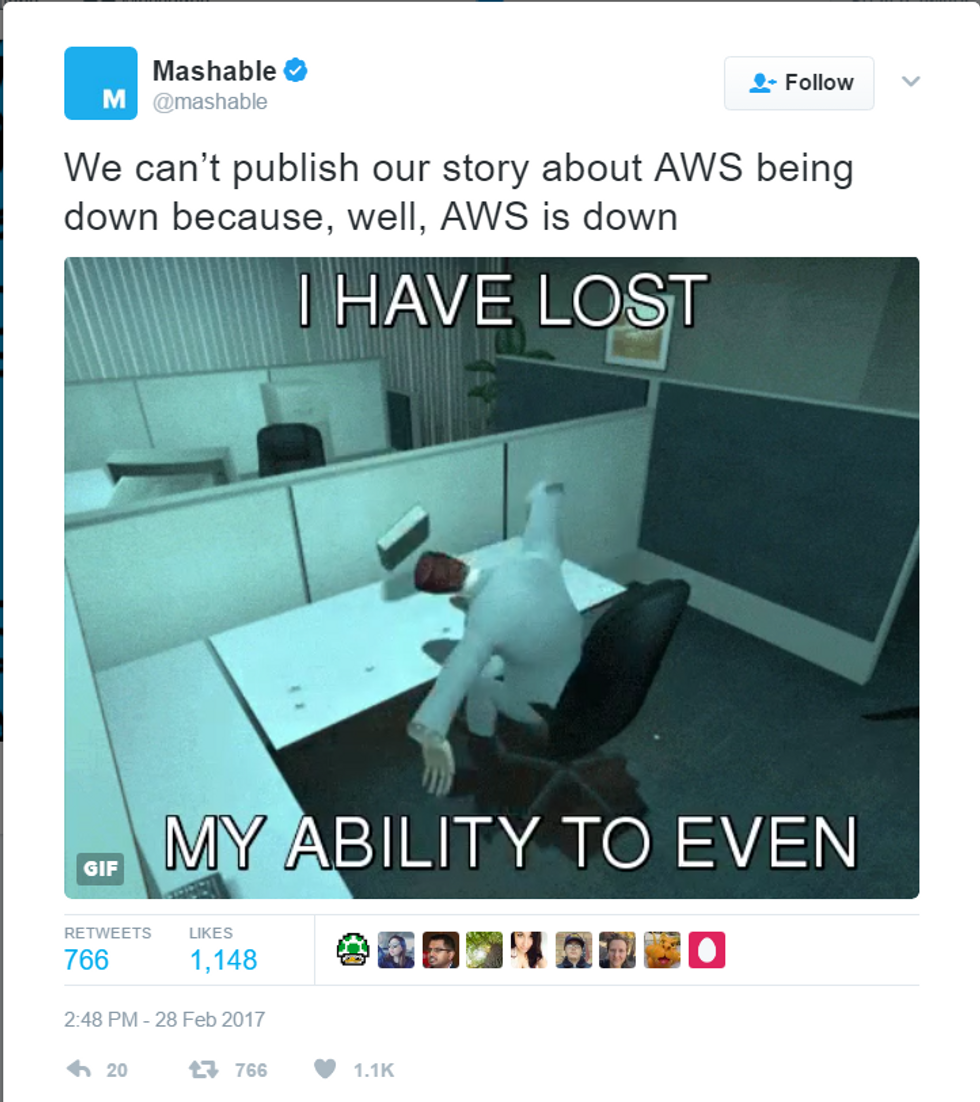Last Tuesday, you might have seen some websites, apps, and devices malfunctioning. Maybe you noticed some websites not loading photos, or not even loading at all! Other things, such as Amazon Alexa or Philips Hue lights not turning on using their respective applications. These weren't just coincidence. This all occurred because of one server farm went offline unexpectedly.
First, let's go over what all of these services had in common. They all used Amazon's hosting service, Amazon AWS, in order for the services to run. Amazon AWS is a suite of different services, from hosting to automation, that companies can purchase and use from Amazon. Companies like to use a service like this because they can instantly get more server power with a click of a button. Pretty cool right? In theory yes, but not when you have a backup in case this service goes down like it did on Tuesday. This kind of service is great for growing apps and websites because they don't have to purchase and build their own hosting farm for processing users information.
So, what companies and services were affected by the incident? According to VentureBeat.com, "The issues appear to be affecting Adobe’s services, Amazon’s Twitch, Atlassian’s Bitbucket and HipChat, Autodesk Live and Cloud Rendering, Buffer, Business Insider, Carto, Chef, Citrix, Clarifai, Codecademy, Coindesk, Convo, Coursera, Cracked, Docker, Elastic, Expedia, Expensify, FanDuel, FiftyThree, Flipboard, Flippa, Giphy, GitHub, GitLab, Google-owned Fabric, Greenhouse, Heroku, Home Chef, iFixit, IFTTT, Imgur, Ionic, isitdownrightnow.com, Jamf, JSTOR, Kickstarter, Lonely Planet, Mailchimp, Mapbox, Medium, Microsoft’s HockeyApp, the MIT Technology Review, MuckRock, New Relic, News Corp, OrderAhead, PagerDuty, Pantheon, Quora, Razer, Signal, Slack, Sprout Social, Square, StatusPage (which Atlassian recently acquired), Talkdesk, Travis CI, Trello, Twilio, Unbounce, the U.S. Securities and Exchange Commission (SEC), The Verge, Vermont Public Radio, VSCO, Wix, Xero, and Zendesk, among other things. Airbnb, Down Detector, Freshdesk, Pinterest, SendGrid, Snapchat’s Bitmoji, and Time Inc. are currently working slowly." Other smaller websites have also been having issues with images or pages loading. Not only were these services affected, but services like Nest, the smart home device creator known for their Thermostats, were also malfunctioning yesterday.
When seeing that smart home appliances were being affected, I wondered if my Amazon Echo worked. Needless to say, she couldn't do anything for me for those few hours. But it also got me thinking about people who have their homes connected with multiple Smart Home devices, and what was going on there? These twitter post pretty much sum everything up.
Engineers when S3 goes down. #amazon #aws pic.twitter.com/QxWHHvuZ3H
— Danielle Adams (@adamzdanielle) February">https://twitter.com/adamzdanielle/status/836648353... 28, 2017
Most of our devices are now connected on the "Internet Of Things", which a majority of these services run on Amazons AWS service. So not only are the websites that we visit daily hosted on there, but our smart locks, smart thermometers, security systems, smart lights, and other smart home devices are on this. It's pretty safe to say that Amazon really does rule the internet.








 File:Hampton Beach, New Hampshire - low tide - panoramio.jpg ...
File:Hampton Beach, New Hampshire - low tide - panoramio.jpg ... fire on fire pit during night time
Photo by
fire on fire pit during night time
Photo by  Free Images : american lobster, dish, new england clam bake ...
Free Images : american lobster, dish, new england clam bake ... vanilla flavor ice cream with chocolate syrup
Photo by
vanilla flavor ice cream with chocolate syrup
Photo by  File:Celebrity Silhouette (ship, 2011) 002.jpg - Wikimedia Commons
File:Celebrity Silhouette (ship, 2011) 002.jpg - Wikimedia Commons
 StableDiffusion
StableDiffusion
 StableDiffusion
StableDiffusion
 StableDiffusion
StableDiffusion
 StableDiffusion
StableDiffusion
 StableDiffusion
StableDiffusion
 StableDiffusion
StableDiffusion




 Going to the cinema alone is good for your mental health, says science
Going to the cinema alone is good for your mental health, says science












 women in street dancing
Photo by
women in street dancing
Photo by  man and woman standing in front of louver door
Photo by
man and woman standing in front of louver door
Photo by  man in black t-shirt holding coca cola bottle
Photo by
man in black t-shirt holding coca cola bottle
Photo by  red and white coca cola signage
Photo by
red and white coca cola signage
Photo by  man holding luggage photo
Photo by
man holding luggage photo
Photo by  topless boy in blue denim jeans riding red bicycle during daytime
Photo by
topless boy in blue denim jeans riding red bicycle during daytime
Photo by  trust spelled with wooden letter blocks on a table
Photo by
trust spelled with wooden letter blocks on a table
Photo by  Everyone is Welcome signage
Photo by
Everyone is Welcome signage
Photo by  man with cap and background with red and pink wall l
Photo by
man with cap and background with red and pink wall l
Photo by  difficult roads lead to beautiful destinations desk decor
Photo by
difficult roads lead to beautiful destinations desk decor
Photo by  photography of woman pointing her finger near an man
Photo by
photography of woman pointing her finger near an man
Photo by  closeup photography of woman smiling
Photo by
closeup photography of woman smiling
Photo by  a man doing a trick on a skateboard
Photo by
a man doing a trick on a skateboard
Photo by  two men
two men  running man on bridge
Photo by
running man on bridge
Photo by  orange white and black bag
Photo by
orange white and black bag
Photo by  girl sitting on gray rocks
Photo by
girl sitting on gray rocks
Photo by  assorted-color painted wall with painting materials
Photo by
assorted-color painted wall with painting materials
Photo by  three women sitting on brown wooden bench
Photo by
three women sitting on brown wooden bench
Photo by 








